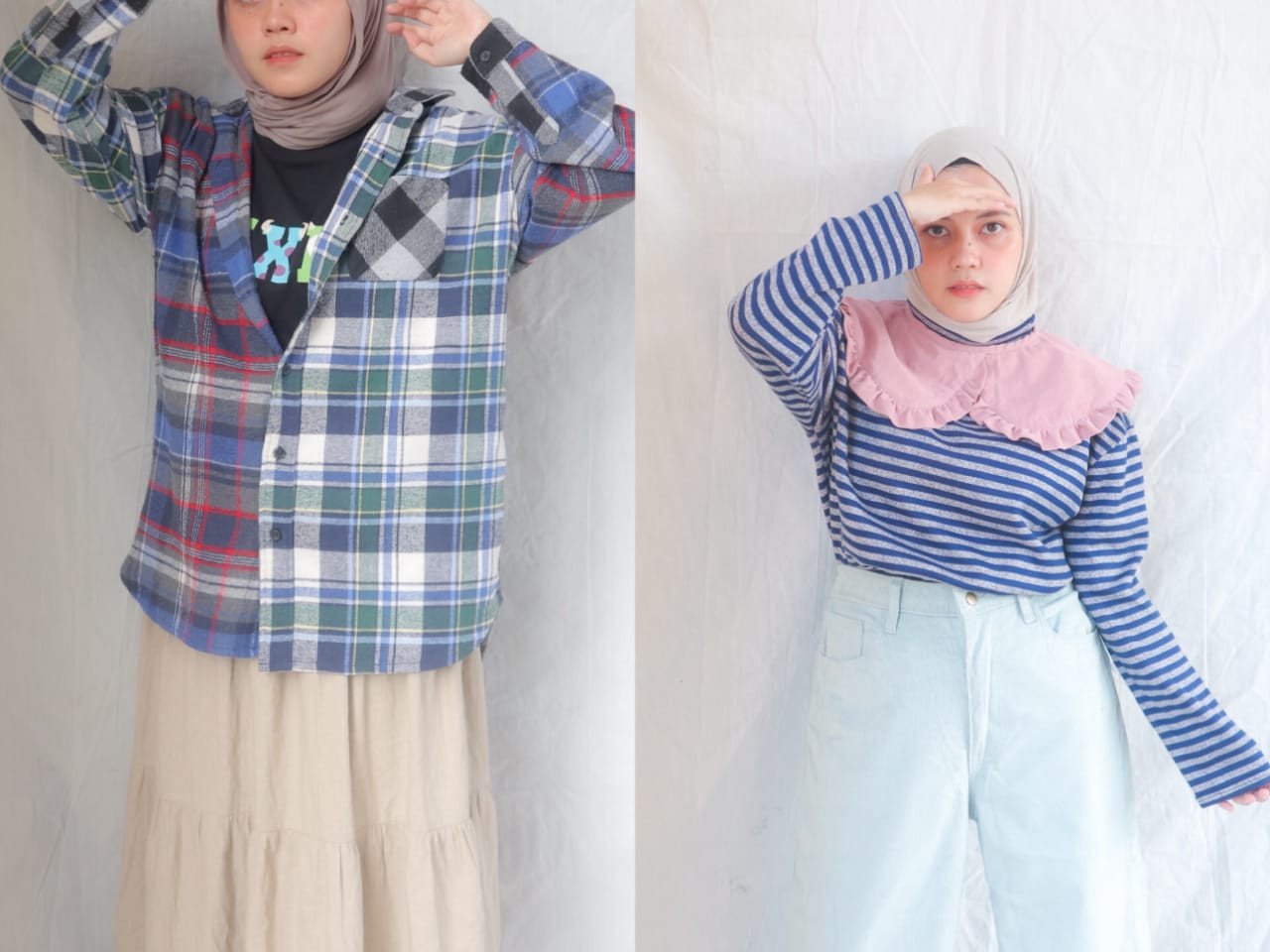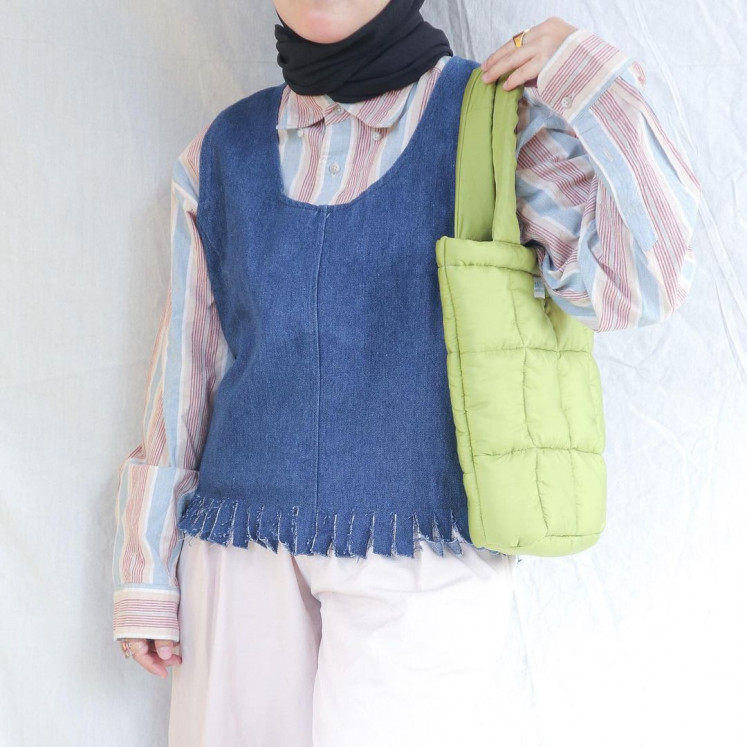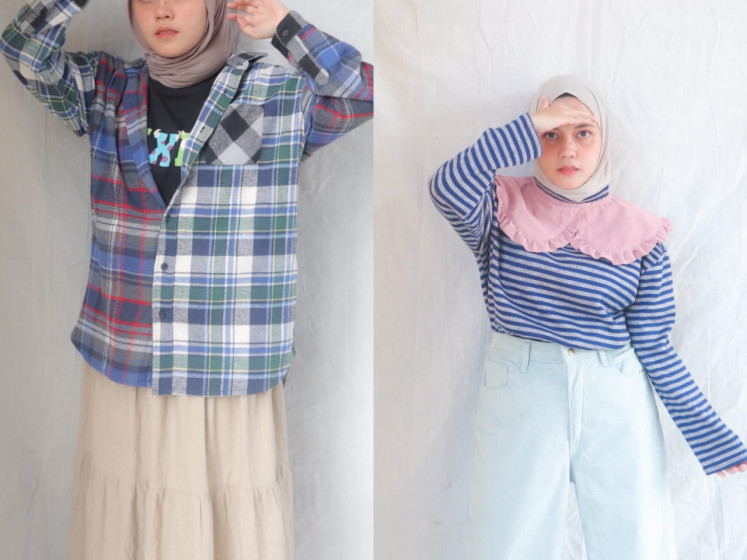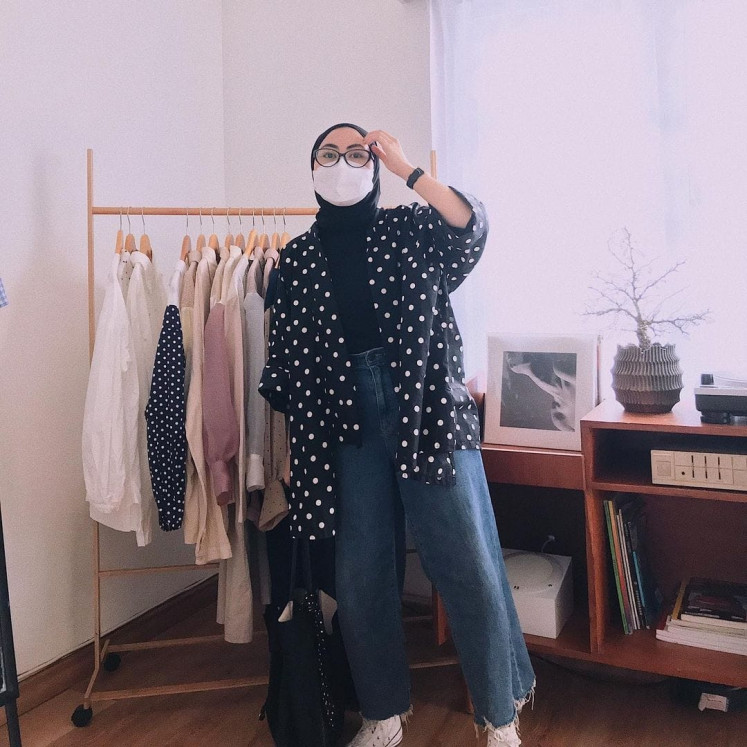Popular Reads
Top Results
Can't find what you're looking for?
View all search resultsPopular Reads
Top Results
Can't find what you're looking for?
View all search resultsTwice as nice: Reworking fashion to reduce waste
Change text size
Gift Premium Articles
to Anyone
S
econdhand fashion, known colloquially as “reworked thrift”, is making its way to a larger audience with its attractive, affordable prices amid the pandemic-induced financial storm.
Whether you want to stay on top of the latest trends or express your individuality with unique and vintage clothing, thrift shopping allows you to put together a one-of-a-kind wardrobe. Reworked clothing, dubbed “reworked thrift” among Indonesian fans, elevate that uniqueness.
When Via Rini Anggraeni started her Teman Thrifty (@temanthrifty) Instagram account in October 2019, she sold ordinary secondhand clothing. Her aim was to promote the appreciation of secondhand clothing so it could reach more people and encourage “a higher sales value”.
Thrift flipping, or reworking used or old clothing into a new item, typically requires more skills than just browsing the aisles of a secondhand store. The idea is to redesign and resew used or old items into new garments, and the circular fashion trend has succeeded in attracting more people.
Via, a 24-year-old communication graduate of the Islamic University of Bandung, started uploading pictures of her reworked pieces in October 2020. "I tried to apply ‘fun and cute’ to Teman Thrifty [thrifty friend]. The results were beyond my expectations," she said.
Exploring a different type of sustainable fashion, chance led Hana Surya to start Threadapeutic, which bills itself as “a sustainably minded artisanal textile studio with a passion for fabric reconstruction and a goal to minimize waste”.
Upcycled creations: Zulfah Nazala's Bazooku sometimes produces accessories like this quilted bag depending on the types of materials she has at hand. (Courtesy of Zulfah Nazala). (Personal collection/Courtesy of Zulfah Nazala)The working mother was the international liaison for Indonesia Fashion Week 2015, whose tasks included providing upcycled souvenirs from leftover banners and fabrics.
"From that point, I realized there was a market [for upcycled fashion],” said Hana, adding that her business was still growing.
Stitch and slash
Six months after setting up her business, Hana encountered the textile technique for producing a faux chenille effect, also called stack and slash quilting. She learned the technique from her cousin, Dina Midiani, a senior fashion designer known for crafting products with leftover fabric.
"[I accidentally sold] my cousin's textile for only Rp 500,000 [US$35]. She scolded me. It was supposed to sell at a higher price," said Hana, recalling a related incident.
The intricate technique involves layering fabrics and then slashing them carefully to create a frayed texture. It has allowed Hana and her team to manipulate many types of fabric.
"We [can manipulate] T-shirts, but we don't accept knitted [tops]. We accept cotton, polyester-cotton [blends], chiffon, all kinds of denim," she said. Her team then upcycled the fabrics to produce bags, clutches and masks, even wall hangings.
Conscientious fashion: Zulfah Nazala, the founder of Bazooku, believes that the young generation has a responsibility in tackling fashion waste through producing and busying reworked clothing. (Courtesy of Zulfah Nazala) (Personal collection/Courtesy of Zulfah Nazala)Several fashion brands have collaborated with Threadapeutic to donate their leftover fabrics, including Purana, SukkhaCitta and (X)SML. One time, a hotel even donated their old bedsheets.
As her business grew, Hana started approaching local garment manufacturers to donate their offcuts. "Our fabric is supplied by a garment manufacturer in Pulo Gadung for free," she said.
Zulfah “Upe” Nazala, the 24-year-old founder of Bazooku, hunts for her fabric supply in the textile manufacturing hub of Cigondewah, West Java. She also scours the neighborhood tailor shops for scrap fabric armed with a weekly theme, “so it’s easier for us to find the colors that match the theme of the week".
Upe and Via are both based in the garment mecca of Bandung, so they are surrounded by secondhand clothing stores.
"The initial process is to hunt for materials in the market for mixing and matching with other used fabrics and polka-dot fabrics," said Via, adding that the popular fabric pattern had become somewhat iconic of Teman Thrifty.
Iconic pattern: Via Rini Anggraeni, who founded Teman Thrifty, poses in a jacket made from polka-dot fabric, which has become the "face" of her reworked fashion business. (Courtesy of Via Rini Anggraeni) (Personal collection/Courtesy of vVia Rini Anggraeni)To meet her target of producing 50-60 items from each batch of fabrics, Via sprays the used clothing with disinfectant and then sends them to her trusted tailors, who take three to five days to cut and resew the materials into finished pieces. Via picks up the new products and takes them to a laundry service before styling them into product photos and finally, uploading the photos to Instagram to sell them.
"Now there are three people who help with the production process. All are tailors, but I [handle the sorting] myself because I sell things that I really like, from the material to the design," she said.
Twice the price
Via, who once sold an entire collection in a mere two hours on Instagram, makes Rp 10 million to Rp 15 million each month.
The robust business has been increasingly gaining attention, especially from the niche market of green fashion devotees, and recently opened an offline store at The Hallway Space in Kosambi, Bandung, to handle the rush. With an affordable price ranging from Rp 140,000 to Rp 189,000, Teman Thrify’s products are highly popular among young women.
Teman Thrifty’s comments section on Instagram is constantly flooded with jastip, short for jasa titip (buying service), offering their services. One of these is Evaatul Istifadah, a 26-year-old housewife in Muara Enim, South Sumatra.
"I’ve won only two out of four jastip wars," she said, referring to the ferocious competition over limited online sales items.
Khairunnisa Mellynia Agusdini, a 21-year-old student in her final year at University of Technology Malaysia in Johor Bahru, has a special trick to secure her favorite items: "Teman Thrifty allows us to take screenshots of the clothes we want before [it’s] time to order the clothes, but that doesn't mean we've [reserved] the clothes."
The circular fashion industry has more space to grow. Threadapeutic realized this and quickly switched gears during the pandemic to fill the sudden drop in retail fashion sales. The brand has been exploring the interior design market since it presented a fabric wall panel in 2019 at the renowned decoration and lifestyle trade fair, Maison&Objet Paris. Today, their wall panels are featured in two installations at the Bank Jago head office in South Jakarta.
"We've been doing wall panel projects since the beginning of the pandemic in 2020. Before the pandemic, we produced around 20 custom bags per month. The price of our bags is quite high, so we don't make too many," said Hana.
Selling her products at a price range of S$19 ($14) to S$450, Hana said the Threadapeutic team was ready to cater to select customers. "We also want people to be more conscious of what they buy, instead of just shopping carelessly. We don't demand that people buy a lot or anything. We focus on quality," she said.
Reworked fashion entrepreneurs offer a more sustainable, environmental take on fashion, especially as thrift fashion has been receiving a lot of backlash from many fashion waste activists and others for the amount of waste it produces.
"The clothes will remain as waste without being [reused],” explained Upe.
“As the next generation, it is precisely [our responsibility] to rethink [fashion] so a garment [is sustainable] to reduce textile waste,” she stressed.
ohmg














